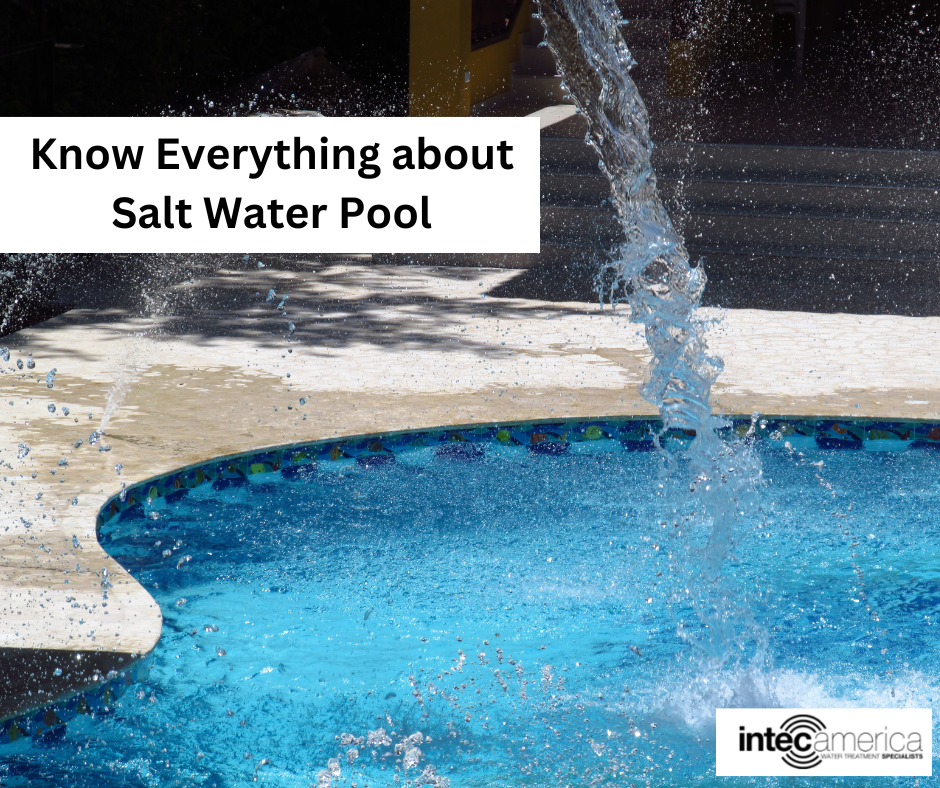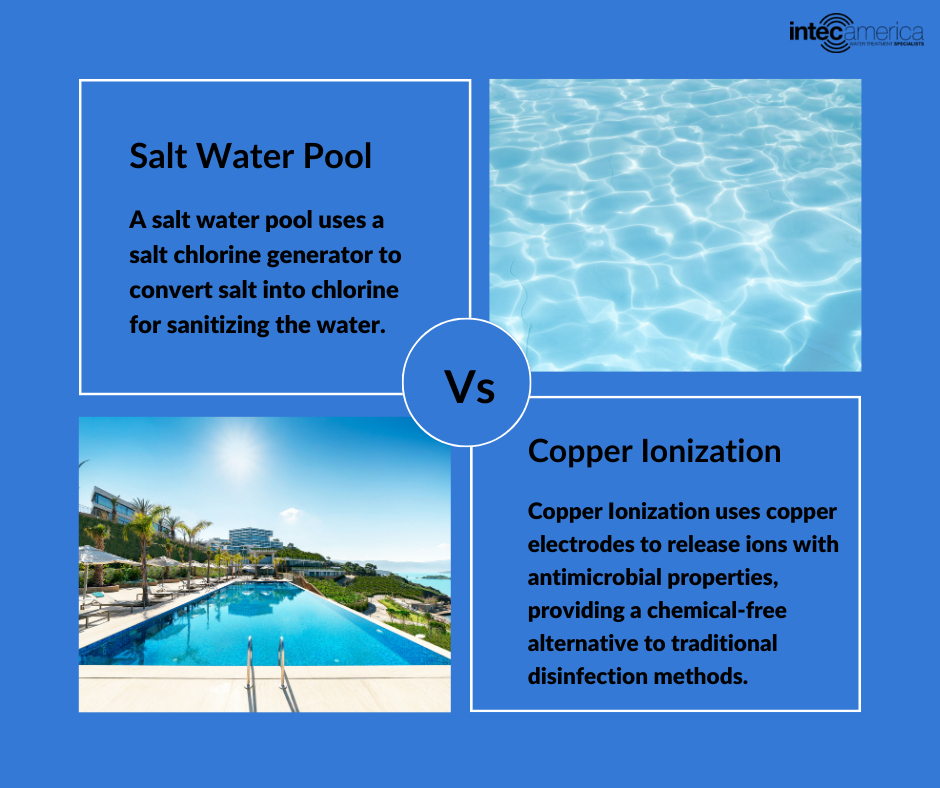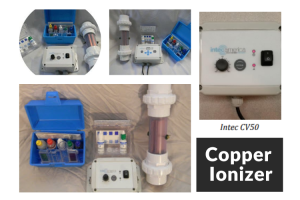Salt Water Pool System: Everything You Need To Know
Saltwater pools have gained popularity in recent years and are considered a great alternative to chlorine pools. It is a common misconception that saltwater pools are filled with ocean water. However, these pools get their name from the salt water being used to create chlorine through a saltwater generator (SWG). Having heard these, you may have these questions in mind:
- How are these salt water pools different from traditional pools?
- Are these salt water pools superior to traditional pools?
- Are they more effective than regular chlorinators or chlorine tablets used for pool sanitization?
- Are there superior alternatives to salt water pool systems?
This post answers these questions and introduces you to copper ionization systems used for pool sanitization.
What is a Salt Water Pool?

A salt water pool is filled with pool-grade salts to recreate the oceanic effect. The recirculation system of the saline pool features a chlorine generator, which performs sanitizing actions to keep the pool clean, clear, and microbe-free. The swimming pool has 3,000 – 3,600 ppm (parts per million) salinity; however, the ocean has 35,000 ppm – which is 10 times higher than the pool. Many swimmers feel these salty pools are gentler, as there are no chemicals added. As a result, many hotels, resorts, and luxury accommodation have already replaced their traditional chlorine pools with in-ground salt water pools.
Traditional chlorine pools and saltwater pools are similar in many ways and differ in other ways. The following pointers will help you understand the similarities and differences between chlorine and saltwater pools.
- Chlorine and saltwater pools require balancing of pH, alkalinity, and calcium level adjustments. Both these pools use the same type of chemicals for these adjustments. However, the only difference is that chlorine is not directly added to the salt water pool.
- Chlorine pools are sanitized using chlorine tablets or chlorine powder, whereas saltwater pools generate their own chlorine through electrolysis. The chlorine generator in the filtration system convert the sodium chloride in water into chlorine. Although hypochlorous acid is the common sanitizer in both chlorine and salt water pools, the delivery process differs largely.
- The salt water pool may require a high initial investment, but the operational cost gets cheaper with regular use. However, the chlorine pool has a low initial investment, but it requires high maintenance and operating costs in the long run.
- Traditional chlorine pools emanate a strong chlorine scent; however, saltwater pools have no chemical scent, which makes them popular with people.
- Saltwater pools have a tendency for the pH to rise faster than pools using trichlor for example as the SWG process processes hydroxide radical increasing the alkalinity and pH
How Does a Salt Chlorine Generator Work?
The salt chlorine generator features two primary components – the control board and the cell.
The cell features a series of metallic grids, which breaks down salt into tiny chlorine bubbles, when salt water passes through it. The chlorine produced in this reaction mixes with pool water to form hypochlorous acid. Most people use solar salt, mechanically evaporated salt, and mined salt in their pools; however, the salts with the highest purity is always better. They help reduce maintenance costs in the long run.
Advantages and Disadvantages of Salt Water Pools
Salt water pools offer several advantages, which makes them popular over traditional chlorine pools. The following are only a few advantages of these pools.
- A saltwater pool is more expensive upfront compared with a regular chlorinated pool. The equipment will cost upwards of $1,600. Saltwater is corrosive and special decking or sealants used for pool construction may cost an additional $10,000 plus.
- As mentioned earlier, the corrosive water is known to attack metal frames of inground vinyl-liner pools and often have to be replaced earlier than that of a traditional chlorinate pool.
- Some equipment manufacturers will not honor their warranty if installed on a salt water pool so be advised to look into this.
- Metal fencing around the pool and lawn furniture may rust from water spray and evaporation.
- Anchors used for ladders and rails as well as lighting fixtures tend to rust and compatible noncorrosive alternatives will cost a premium.
- Saltwater pools require regular cleaning because salt lumps or residues may settle on the pool floor and the pool equipment. Especially swimming pools with water features. If avoided, the salt lumps may calcify on the material surface and degradation may occur gradually requiring resurfacing.
- The flow cells will require periodic cleaning to remove calcification and scale for optimal efficiency. Otherwise, the cell will short out and are expensive to replace. These technologies also tend to have a planned obsolescence in that the cell will stop being manufactured and the entire system will have to be replaced.
- You will require the assistance of expert technicians for repairs.
Due to these disadvantages, many pool owners prefer fitting their existing pools with copper ionization systems. Which is better – copper ionization system and salt water system? Read the next section to know more.
Copper Ionization vs. Salt Water Systems

Copper ionizers and salt water systems serve the same purpose – sanitation. However, they differ in many ways. The following pointers will help you understand the same.
- System Installation: Both copper ionization systems and salt chlorinators are plumbed on the pool line.
- pH Balancing: When using a saltwater generation system, you need to add large amount of salts to the pool to initiate the chlorination process. The salt cell will convert the salt to chlorine. The process produces alkaline compounds which drive the pH up so you must use a pH balancer more often to maintain the pH value to range. The pH balancing becomes important because chlorine may not work effectively if the pH value is too high. Copper ionizer produces cupric ions on electrolysis and is a neutral pH. It does not require external chemicals or materials to initiate the process. Since copper ions have no severe impact on the pH value of the pool, the balancing is required more to the makeup water used from evaporation.
- Investment: Quality copper pool ionization systems cost $900 upwards. However, quality salt chlorinator systems cost $1,200 upwards. The copper electrodes need replacement every other season if used on a large pool (cost $135). However, it may last much longer if used in a small pool. The salt chlorinator can last up to 4-5 years if it is maintained properly. It may cost you anything above $800 for the replacement of cells in these devices. In addition to cell replacement, you would need to spend on salt, chemicals, acids, and so on. Quality ionization systems have a self-cleaning process where as salt water cell must be manually cleaned and descaled.
Finally, the choice of the salt water system and copper ionizer will depend on your requirements. If you wish to convert your existing chlorine pool or saltwater pool into a mineral pool, you must invest in good copper ionizer systems.

This post ends by introducing you to Intec-America’s copper pool ionizer systems, which are equipped with the highest purity grade copper electrodes. The design for these pool ionizers was inspired NASA’s water ionization concept. The company offers different types of pool ionizers, including CA10, CV50, CV60, and CV60-C for different pool sizes. You can contact the team at Intec-America to know more about these pool ionizer systems.
Frequently Asked Question Related to Salt Water Pool
What is Salt Water Pool Cost?
The cost of a saltwater pool installation can vary based on pool size, location, and system type. The cost of installing a saltwater pool ranges from $25,375 to $64,060, with an average cost of $37,315. Smaller projects may cost around $12,515, while larger ones with expensive materials can cost up to $100,000. Converting an existing pool to a saltwater system may cost between $500 and $2,110. Typically, a saltwater generator costs between $500 to $2,000, and installation costs range from $500 to $1,500. Ongoing maintenance costs include occasional cell replacement, which can be expensive. Despite higher costs than traditional chlorine systems, saltwater pools are popular for their softer water and lower maintenance.
What is maintenance cost of salt water pool?
The maintenance cost of a saltwater pool can vary depending on factors such as the size of the pool, the climate, and the level of use. Generally, saltwater pools require less maintenance than traditional chlorine pools, but there are still some ongoing costs to consider. These include the cost of salt, which is relatively inexpensive, and occasional cell replacement, which can cost several hundred dollars. Other maintenance costs may include testing and balancing the pool’s pH and alkalinity levels, cleaning the pool, and repairing any equipment issues that may arise. The total maintenance cost of a saltwater pool will depend on the specific needs of the pool and the owner’s maintenance habits.
Recent Blog Posts
- Everything You Need to Know About Distilled Water
- Well Water Contamination: Causes, Symptoms and Treatment
- Guide to make rainwater potable
- Know Everything About Rainwater Harvesting
- Microplastics in Drinking Water: Causes and Prevention Overview
- Mercury in Drinking Water – Causes, Effects, and Prevention Explained
- Salt-Free Water Softeners for Residential Water Treatments
- Installation of Whole House Water Filters


